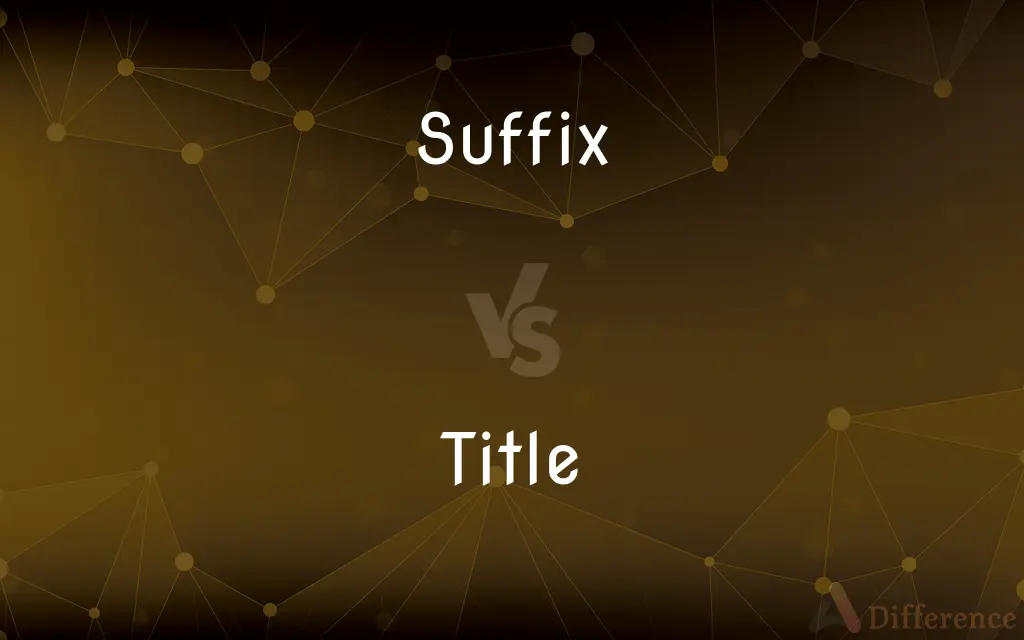Suffix vs. Title — What's the Difference?
By Tayyaba Rehman & Maham Liaqat — Updated on March 11, 2024
A suffix follows a person's name, indicating qualifications or position, e.g., Ph.D., whereas a title precedes a name, showing respect or professional status, e.g., Dr.

Difference Between Suffix and Title
Table of Contents
ADVERTISEMENT
Key Differences
Suffixes are added to the end of a person’s name and often denote academic degrees, professional certifications, or familial relations, such as "Jr." or "III". Titles, on the other hand, are placed before a person’s name to indicate respect, professional status, or honor, such as "Mr.", "Dr.", or "Professor".
While suffixes provide specific information about a person’s achievements, lineage, or qualifications, titles are used as a form of address that can reflect one's role in society, profession, or marital status. Titles help in setting a formal or respectful tone in communication, whereas suffixes add detail to a person's identity.
Titles are universal in their application across different contexts, from formal introductions to written correspondence. Suffixes, however, are often included in more formal, professional, or academic environments to highlight particular credentials or distinctions.
The use of a suffix can be a matter of personal choice or cultural tradition, emphasizing one's background or accomplishments. Titles, while also subject to personal and cultural variations, are more broadly recognized markers of social etiquette and hierarchy.
In some cases, titles and suffixes can convey similar information, such as "Esq." used as a suffix for lawyers, which might overlap with professional titles like "Dr." for a Ph.D. holder. This reflects how both elements can play a role in illustrating a person's professional and academic identity.
ADVERTISEMENT
Comparison Chart
Position
Follows a person's name.
Precedes a person's name.
Purpose
Indicates qualifications, achievements, or lineage.
Shows respect, professional status, or honor.
Usage Context
Formal, professional, academic.
Broad, including formal and informal settings.
Examples
Jr., Sr., Ph.D., M.D.
Mr., Mrs., Dr., Professor.
Variability
Can be multiple for one individual.
Usually one is used at a time, depending on context.
Compare with Definitions
Suffix
A set of letters placed after a person's name to indicate qualifications.
John Smith, M.D. specializes in family medicine.
Title
Used in addressing individuals in certain professions.
Captain Rogers piloted the flight.
Suffix
Reflects professional certifications or honors.
Lisa Ray, PMP, led the project.
Title
Reflects marital status or gender.
Mrs. Parker recently moved here.
Suffix
Indicates generational position within a family.
Alex Johnson Jr. shares his father's name.
Title
A formal prefix to a name, denoting respect or social status.
Ms. Greene taught the class.
Suffix
Can denote academic degrees.
Samantha Doe, Ph.D., published her research.
Title
Indicates professional or academic status.
Professor Smith will attend the conference.
Suffix
Sometimes indicates nobility or honorary titles.
David Thompson, Esq., represented the case.
Title
Can denote leadership or royal status.
Queen Elizabeth II has reigned for decades.
Suffix
In linguistics, a suffix is an affix which is placed after the stem of a word. Common examples are case endings, which indicate the grammatical case of nouns, adjectives, and verb endings, which form the conjugation of verbs.
Title
A title is one or more words used before or after a person's name, in certain contexts. It may signify either generation, an official position, or a professional or academic qualification.
Suffix
An affix added to the end of a word or stem, serving to form a new word or functioning as an inflectional ending, such as -ness in gentleness, -ing in walking, or -s in sits.
Title
The name of a book, composition, or other artistic work
The author and title of the book
Suffix
To add as a suffix.
Title
A name that describes someone's position or job
Leese assumed the title of director general
Suffix
A morpheme added at the end of a word to modify the word's meaning.
The suffix "-able" changes "sing" into "singable".
Title
The position of being the champion of a major sports competition
Davis won the world title for the first time in 1981
Suffix
(mathematics) A subscript.
Title
A right or claim to the ownership of property or to a rank or throne
The buyer acquires a good title to the goods
A grocery family had title to the property
Suffix
(computing) A final segment of a string of characters.
The string "abra" is both a prefix and a suffix of the string "abracadabra".
Title
(in church use) a fixed sphere of work and source of income as a condition for ordination.
Suffix
(transitive) To append (something) to the end of something else.
Title
Give a name to (a book, composition, or other work)
A report titled The Lost Land
Suffix
A letter, letters, syllable, or syllables added or appended to the end of a word or a root to modify the meaning; a postfix.
Title
An identifying name given to a book, play, film, musical composition, or other work.
Suffix
To add or annex to the end, as a letter or syllable to a word; to append.
Title
A general or descriptive heading, as of a book chapter.
Suffix
An affix that is added at the end of the word
Title
A written work that is published or about to be published
The titles in the publisher's fall catalog.
Suffix
Attach a suffix to;
Suffix words
Title
A division of a legal code, generally consisting of multiple related statutes.
Title
Often titles Written material to be read by viewers that is included in a film or television show, typically presenting credits, narration, or dialogue.
Title
A written piece of translated dialogue superimposed at the bottom of the frame during a film; a subtitle.
Title
A formal appellation attached to the name of a person as a sign of office, rank, profession, or hereditary privilege.
Title
A descriptive name; an epithet
The dubious title of the worst bowler in the league.
Title
A right or claim, or the basis of a right or claim
"The weight of a fish is commonly its only title to fame" (Henry David Thoreau).
Title
A form of ownership free of valid claims by other parties.
Title
The aggregate evidence that gives rise to a legal right of possession or control.
Title
The instrument, such as a deed, that constitutes this evidence.
Title
Sports & Games A championship
Which boxer won the heavyweight title?.
Title
A source of income or area of work required of a candidate for ordination in the Church of England.
Title
A Roman Catholic church in or near Rome having a cardinal for its nominal head.
Title
To give a name or title to.
Title
An appellation given to a person or family to signify either veneration, official position, social rank, the possession of assets or properties, or a professional or academic qualification. See also :Category:Titles
Title
(property law) Legal right to ownership of a property; a deed or other certificate proving this.
A good title to an estate, or an imperfect title
Title
In canon law, that by which a beneficiary holds a benefice.
Title
A church to which a priest was ordained, and where he was to reside.
Title
The name of a book, film, musical piece, painting, or other work of art.
I know the singer's name, but not the title of the song.
Title
A publication.
The retailer carries thousands of titles.
Buyers of the new video game console can choose from three bundled titles.
Title
A section or division of a subject, as of a law or a book.
Title
A written title, credit, or caption shown with a film, video, or performance.
The titles scrolled by too quickly to read.
Title
(bookbinding) The panel for the name, between the bands of the back of a book.
Title
The subject of a writing; a short phrase that summarizes the entire topic.
Title
A division of an act of law
Title II of the USA PATRIOT Act
Title
(sports) The recognition given to the winner of a championship in sports.
Title
A long title.
Title
A short title.
Title
(transitive) To assign a title to; to entitle.
Title
An inscription put over or upon anything as a name by which it is known.
Title
The inscription in the beginning of a book, usually containing the subject of the work, the author's and publisher's names, the date, etc.
Title
The panel for the name, between the bands of the back of a book.
Title
A section or division of a subject, as of a law, a book, specif. (Roman & Canon Laws), a chapter or division of a law book.
Title
An appellation of dignity, distinction, or preëminence (hereditary or acquired), given to persons, as duke marquis, honorable, esquire, etc.
With his former title greet Macbeth.
Title
A name; an appellation; a designation.
Title
That which constitutes a just cause of exclusive possession; that which is the foundation of ownership of property, real or personal; a right; as, a good title to an estate, or an imperfect title.
Title
A church to which a priest was ordained, and where he was to reside.
Title
To call by a title; to name; to entitle.
Hadrian, having quieted the island, took it for honor to be titled on his coin, "The Restorer of Britain."
Title
A heading that names a statute or legislative bill; may give a brief summary of the matters it deals with;
Title 8 provided federal help for schools
Title
The name of a work of art or literary composition etc.;
He looked for books with the word `jazz' in the title
He refused to give titles to his paintings
I can never remember movie titles
Title
A general or descriptive heading for a section of a written work;
The novel had chapter titles
Title
The status of being a champion;
He held the title for two years
Title
A legal document signed and sealed and delivered to effect a transfer of property and to show the legal right to possess it;
He signed the deed
He kept the title to his car in the glove compartment
Title
An identifying appellation signifying status or function: e.g. Mr. or General;
The professor didn't like his friends to use his formal title
Title
An established or recognized right;
A strong legal claim to the property
He had no documents confirming his title to his father's estate
He staked his claim
Title
(usually plural) written material introduced into a movie or TV show to give credits or represent dialogue or explain an action;
The titles go by faster than I can read
Title
An appellation signifying nobility;
`your majesty' is the appropriate title to use in addressing a king
Title
An informal right to something;
His claim on her attentions
His title to fame
Title
Give a title to
Title
Designate by an identifying term;
They styled their nation `The Confederate States'
Common Curiosities
Are there any titles that are also used as suffixes?
Yes, for instance, "Esq." is used as a suffix but functions similarly to a title for lawyers.
Is it necessary to use titles in all communications?
While not always necessary, titles are often used in formal communications to convey respect.
Can someone use both a title and a suffix simultaneously?
Yes, it's common to use both, especially in formal contexts, e.g., "Dr. Jane Doe, Ph.D."
Can suffixes change over time?
Yes, individuals may acquire new suffixes due to academic achievements or professional certifications.
Can titles and suffixes indicate gender?
Titles often indicate gender or marital status (e.g., Mr., Mrs.), while suffixes usually do not.
How do you choose which title to use?
The choice depends on the context, relationship to the person, and the message you wish to convey.
Are suffixes hereditary?
Some suffixes, like "Jr." or "III", indicate lineage and are hereditary.
Do all professions have specific titles?
Many professions have specific titles, but not all; the usage varies by field and region.
Why are titles and suffixes important in academia?
They signify academic achievements and positions, important for recognition and respect in academic circles.
Are suffixes used in all cultures?
The use of suffixes varies by culture and is more prevalent in some societies than others.
Can anyone use the suffix "Esq."?
Typically, "Esq." is used by lawyers in certain jurisdictions and is not meant for general use.
How important are titles in professional settings?
Titles can be very important in professional settings, signaling respect and acknowledging one's role or achievements.
What's the etiquette for using titles and suffixes in emails?
Use titles and suffixes in formal emails or when addressing someone for the first time, unless otherwise requested.
Can the misuse of titles or suffixes cause offense?
Yes, incorrect use can be seen as disrespectful or imply a lack of acknowledgment of someone's status or achievements.
Are there cultural differences in the use of titles and suffixes?
Absolutely, practices vary widely across cultures, with some placing more emphasis on these conventions than others.
Share Your Discovery

Previous Comparison
Weir vs. Dam
Next Comparison
Awarded vs. ConferredAuthor Spotlight
Written by
Tayyaba RehmanTayyaba Rehman is a distinguished writer, currently serving as a primary contributor to askdifference.com. As a researcher in semantics and etymology, Tayyaba's passion for the complexity of languages and their distinctions has found a perfect home on the platform. Tayyaba delves into the intricacies of language, distinguishing between commonly confused words and phrases, thereby providing clarity for readers worldwide.
Co-written by
Maham Liaqat














































